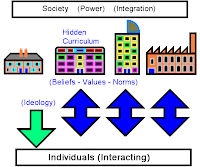

(4) We need a more central location and organization for this kind of compilation.
Secret curriculum how to#
Meta-advice: any time you have to do something new in grad school (take stats, write a lit review, get an R&R, do a poster, do a master’s proposal, apply for a grant, attend a conference, whatever) make the assumption that somebody can tell you how to do it, you don’t have to figure it out on your own, and look for info. (3) Sometimes the information has been given but you haven’t “heard” it because it wasn’t relevant to you yet and you were flooded with other things, so you tuned it out. Mentors ought to get better at asking questions about what people do or do not know, hopefully in a non-stigmatizing way. As a mentor, it is often difficult to find out what people don’t know, as it is patronizing to tell them things they do know.


(2) A lot of the problem is the things you don’t know that you don’t know you don’t know, so you don’t know there is information out there to ask about. Entitled students ask LOTS of questions, assume they have the right to find out things they don’t already know. There’s lots of stuff I’m willing to tell people if they let me know they want to know it. While agreeing entirely about importance of horizontal mentoring, I’d also urge students to test profs with questions to see whether they answer them or just act rude. (1) Sad when I hear stories of profs being rude when a student asks a question, and I know it is real, but honestly many of us are willing to answer them without trying to make you feel like an idiot.


 0 kommentar(er)
0 kommentar(er)
